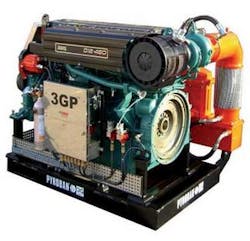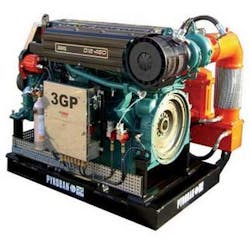Diesel engines suited to hazardous area operations
Volvo Penta has certified two of its marine engines, one mechanical and one electronic, for use in ATEX Zone 2 environments, including offshore.
The two engines are the D7 TA and the D12 MH, both six-cylinder, four-stroke, direct-injected, turbocharged, after-cooled marine diesel engines. D7 is a mechanical engine with a maximum power rating of 265 hp at 2,300 rpm, while D12, an electronic engine, generates a maximum 550 hp at 1,900 rpm, and can produce 775 hp. Both engines are fully compliant with existing environmental regulations, including the IMO NOx family certificate and EPA Tier 2 marine commercial regulations.
Compliance with ATEX Zone 2 requirements allows equipment to be used in areas with a possible risk of gas explosion. This is relevant to many of the applications for Volvo Penta’s marine engines, such as hydraulic power packs, jetting systems, compressors, and coiled tubing pump units, as well as pure power generation.
D12 is also Volvo Penta’s first electronic engine for offshore use, says Jack Foote, area manager for Scotland. He concedes that many offshore customers have reservations about electronic engines, seeing them as having more components liable to go wrong than the traditional mechanical engine. On the other hand, he claims, the electronic version offers the best route to meeting ever more demanding emissions requirements.
North Sea service
According to Foote, Aberdeen-based service companies have installed seven D7 engines for high-pressure pumping duty in the North Sea. Pump supplier Calder has ordered a further six D7 engines for similar applications.
Calder is a regular customer of Volvo Penta. Last year it acquired seven of the company’s TAMD 165 mechanical engines for delivery to Lundin’sIkdam production ship which operates off Tunisia. Calder recently placed an order for a further three D7s, and may request a further six.
Some of these orders involve fasttrack delivery, well within the normal period. “Especially on larger engines, we can deliver in four months maximum,” Foote says, “compared with eight to 10 months for some of our competitors.”
Explosion protection specialist Pyroban prepared the D7 and D12 engines for ATEX certification. “We went for an independent review,” Foote explains, “as we wanted to be on the safe side. We felt it would be better to get a recognized body to undertake certification.”
When Pyroban inspected the D12 with a thermal imaging camera, it found a hot spot on the turbocharger where the temperature was close to the permitted 200º C limit. For this reason, the D12 ATEX approval for the time being applies to use in ambient temperatures up to 26º C, restricting its application to northern latitudes.
Various solutions for the hot spot are under evaluation, including the application of different types of insulation coating which Pyroban has been investigating. But Volvo Penta is also working on a mechanical solution, and this may be the preferred choice, Foote says. The company aims to resolve this situation quickly, allowing it to display the engine at the Offshore Technology Conference in Houston in May.
Once a solution has been found, it should be possible to extend the D12 ATEX approval to ambient temperatures up to 50º C, enabling the engine to be used in the Middle East and other hot regions. The first sale to a Middle East customer would probably have been clinched by now had ATEX approval for the full range of ambient temperatures been in place, Foote says. The company now intends to apply thermal imaging on all its engines undergoing ATEX certification.
Volvo Penta is now examining potential offshore applications for its D9 and D16 marine engines. Its goal is to have a full power range available with ATEX certification.
For more information contact Linda Ahl, Volvo Penta. Tel +46 31 322 6702, fax +46 31 682 736, [email protected], or Jack Foote, tel +44 1786 480 330,[email protected], www.volvopenta.com

